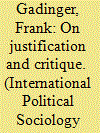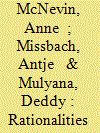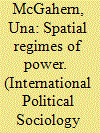|
|
|
Sort Order |
|
|
|
Items / Page
|
|
|
|
|
|
|
| Srl | Item |
| 1 |
ID:
147943


|
|
|
|
|
| Summary/Abstract |
The claim that big data can revolutionize strategy and governance in the context of international relations is increasingly hard to ignore. Scholars of international political sociology have mainly discussed this development through the themes of security and surveillance. The aim of this paper is to outline a research agenda that can be used to raise a broader set of sociological and practice-oriented questions about the increasing datafication of international relations and politics. First, it proposes a way of conceptualizing big data that is broad enough to open fruitful investigations into the emerging use of big data in these contexts. This conceptualization includes the identification of three moments contained in any big data practice. Second, it suggests a research agenda built around a set of subthemes that each deserve dedicated scrutiny when studying the interplay between big data and international relations along these moments. Through a combination of these moments and subthemes, the paper suggests a roadmap for an international political sociology of data practices.
|
|
|
|
|
|
|
|
|
|
|
|
|
|
|
|
| 2 |
ID:
147941


|
|
|
|
|
| Summary/Abstract |
This study develops and examines the concept of hegemonic religion and its relationship with democracy. A religion is hegemonic not only when the state grants that religion exclusive material and political privileges and benefits, but also when the religion is a core element of national identity and citizenship. We empirically examine the link between hegemonic religion and democracy using the Religion and State round 2 (RAS2), Polity, and CIRI datasets. We specifically use religious education policy, financing of religion, and religiously based laws as measures of the extent of religious hegemony in a state. We find that the presence of these religiously hegemonic traits, especially in combination, is strongly associated with a lack of democracy. However, it is possible for democracies to have some hegemonic features but not all of them.
|
|
|
|
|
|
|
|
|
|
|
|
|
|
|
|
| 3 |
ID:
147938


|
|
|
|
|
| Summary/Abstract |
Luc Boltanski is one of the most important contemporary social theorists. Whether and how his sociology matters for International Relations (IR) theory has, so far, not been explored. Boltanski’s work, as this article demonstrates, can greatly advance international political sociology by further developing a practice theoretical account which reconciles Bruno Latour’s Actor-Network Theory and Pierre Bourdieu’s praxeology. Boltanski’s pragmatic sociology is mainly inspired by pragmatism and ethnomethodology, but it is still concerned with sociology as a critical project of emancipation. He aims to renew critical sociology by focusing on the ‘critical capacities’ ordinary actors use in disputes and controversies of political life. Practices of justification and critique as triggers of conflicts and sources of agreements are consequently the subjects of analysis. This implies, furthermore, a strong notion of normativity in practice, which reveals a blind spot in current debates in IR. Justification becomes a social practice through which diverging legitimacy claims are tested under conditions of uncertainty. Such a view is conceptually and methodologically relevant for IR scholars interested in contested norms, moral ambiguity, and the fragile character of political reality. Considering Boltanski’s work broadens the empirical scope of practice theory and provides promising new directions for IR theory.
|
|
|
|
|
|
|
|
|
|
|
|
|
|
|
|
| 4 |
ID:
147942


|
|
|
|
|
| Summary/Abstract |
This article examines the political and social impact of elevating military values in society in a context of austerity. Centering on discussions around two British government “military ethos” initiatives, I consider the idea that military service instills desirable qualities and values in military personnel, making them well suited to educating and socializing children, to the advantage of both children and society. Arguing that these schemes primarily target boys from disadvantaged backgrounds in an effort to turn them into “productive” members of society, I suggest that military ethos initiatives contribute to not only the “raising” of working-class boys but the raising of a class-based army. Moreover, rather than focusing solely on the implications of the military ethos in the British context, I argue that its underlying assumptions about military socialization as a social good have significant geopolitical effects. Through characterizing the military as a core institution of society and its values as moral and good for children, these initiatives obscure the military’s core violent functions. Thus, by both normalizing violence and militarism in everyday life and targeting boys from disadvantaged backgrounds, “military ethos” initiatives engender the subjectivities that provide the very political, social economic, and indeed practical resources that make war possible.
|
|
|
|
|
|
|
|
|
|
|
|
|
|
|
|
| 5 |
ID:
147940


|
|
|
|
|
| Summary/Abstract |
This article examines an Australian-funded counter-smuggling campaign delivered in Indonesia from 2009 to 2014 as an example of the global regulatory regime known as Migration Management. Drawing on fieldwork conducted in Indonesia among the fishing communities targeted by the campaign, we problematize the campaign’s purported success. The appearance of success, we argue, is linked to four interrelated rationalities of governance—security, humanitarianism, managerialism, and colonialism—that shape the terms of reference through which the campaign was conceived, designed, and evaluated. These rationalities “make sense” of a campaign that can otherwise be read as indicative of circular and misdirected strategies of border security. In a second move, we show how the techniques deployed in the campaign give rise to challenges to technocratic control. We argue, by extension, that Migration Management is subject to subtle disruptions and subversions that emanate from the very rationalities through which it is sustained. Our argument exposes the politics at stake in a regulatory regime that is represented as neutral and of benefit to all. It also shows what stands in the way of template reproduction of the Management agenda.
|
|
|
|
|
|
|
|
|
|
|
|
|
|
|
|
| 6 |
ID:
147939


|
|
|
|
|
| Summary/Abstract |
This paper examines the agency of Arab urban spaces in shaping local policing arrangements in Israel using a recent experiment with Combined Municipal Policing (CMP) in the city of Nazareth as a case study. Departing from prevailing analytical approaches to the study of local governance in Arab urban localities in Israel, it adopts a distributive notion of agency that addresses both the role of (uneven) arrangements of power in producing Arab-only urban spaces, as well as the role of (uneven) material assemblages and infrastructures of power—road networks, in particular—in generating, and frustrating, local policing arrangements within them. Building on a critique of ethnocratic theory as it relates to Arab-only localities in particular, it argues that changes in local policing arrangements should not be viewed simply as a sophistication of prevailing mechanisms of control, but rather as an interactional consequence of a more complex spatial regime of power that reveals the latent, unintended, and immanent political potency of the (Arab) city to talk to, with, and back to power.
|
|
|
|
|
|
|
|
|
|
|
|
|
|
|
|
|
|
|
|
|